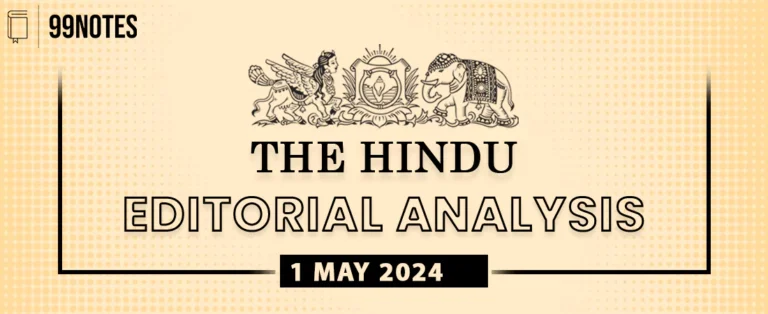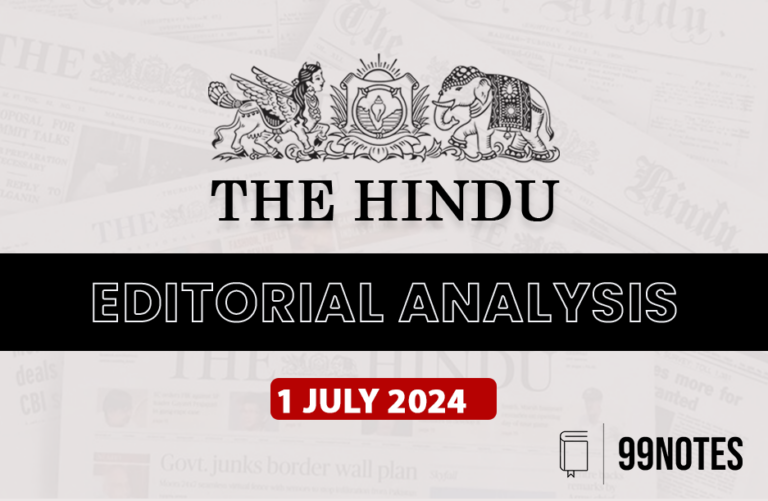30 March 2024 : The Hindu Editorial Notes PDF
The Hindu EDITORIAL
30-March-2024
1. Bonds, big money and an imperfect democracy
|
Topic: GS2 – Indian Polity The topic is crucial for UPSC as it addresses electoral transparency, governance integrity, and challenges to Indian democracy. |
| Context |
| ● The article discusses the ineffectiveness of India’s electoral bonds scheme in curbing black money in politics, highlighting its failure and implications for democracy. |
Introduction:
- The electoral bonds scheme, intended to curb black money in politics, has been declared unconstitutional by the Supreme Court of India.
- Despite its purported aims, the scheme failed to transform Indian politics as illegal financing continues to dominate electoral processes.
- This summary will delve into the gap between the professed objectives and the actual outcomes of the electoral bonds scheme, highlighting its implications for Indian democracy.
Ineffectiveness of Electoral Bonds:
- Electoral bonds aimed to end the financing of elections with black money but failed to make any significant impact.
- Illegal funds still dominate electoral spending, leading to the subversion of democratic principles.
- The scheme lacked transparency and accountability, enabling bribery and manipulation in politics.
Gap Between Professed and Actual Objectives:
- The discrepancy between the professed aim of the electoral bonds scheme and its actual outcomes underscores a broader issue in Indian politics.
- Despite claims to promote transparency, the scheme perpetuated opaque financing practices and vested interests.
- It highlights the hollow nature of Indian politics, where elected leaders prioritize the interests of financiers over constituents.
Impact on Democracy:
- The gap between professed and actual objectives undermines the foundational principles of democracy.
- Government becomes detached from the people’s interests, serving the agendas of elite financiers instead.
- Weak accountability mechanisms and a feudal mindset contribute to the erosion of democracy in India.
Role of Money in Elections:
- Elections in India are heavily influenced by factors like caste, community, and regional affiliations rather than candidates’ performance.
- Political parties rely on illegal funds to finance campaigns, exceeding permitted expenditure limits significantly.
- Money plays a pivotal role in mobilizing voters, organizing rallies, and influencing media coverage.
Critique of Electoral Bonds Scheme:
- The electoral bonds scheme faced criticism for its lack of transparency and potential for abuse.
- It provided a loophole for businesses and the wealthy to influence politics discreetly, undermining the democratic process.
- The removal of donation limits and the anonymity of donors raised concerns about its integrity.
Uncovering Cronyism:
- Data from the electoral bonds scheme revealed instances of quid pro quo between political donations and policy favours.
- Businesses used donations to secure favourable treatment from policymakers or to evade prosecution for wrongdoing.
- The scheme exposed the intertwining of political and corporate interests, highlighting the prevalence of cronyism in Indian politics.
Conclusion:
- The electoral bonds scheme, while purportedly aimed at curbing black money in politics, failed to address the systemic issues plaguing Indian democracy.
- Its ineffectiveness underscores the need for comprehensive reforms to restore transparency, accountability, and integrity to the electoral process.
- Without fundamental changes, Indian democracy remains vulnerable to the influence of vested interests and the erosion of democratic principles.
| Issues with anonymous funding of political parties |
|
●Lack of transparency: Anonymous funding conceals the true sources of financial support, making it difficult for the public to know who is influencing political decisions. ● Potential for corruption: Without knowing where the money is coming from, there’s a risk that politicians may be unduly influenced by special interests or wealthy donors seeking to advance their agendas. ●Undermines democracy: Anonymous funding distorts the democratic process by allowing wealthy individuals or organizations to exert disproportionate influence without being held accountable for their actions. ● Erosion of trust: When political parties receive anonymous donations, it can erode public trust in the integrity of the political system, leading to cynicism and disengagement among voters. ● Legal loopholes: Some jurisdictions may have loopholes or lax regulations that allow for anonymous donations, creating opportunities for illicit funds to enter the political sphere. ● Difficulty in enforcement: Without proper mechanisms in place to track and regulate anonymous donations, enforcement becomes challenging, leading to potential abuses of the system. |
| Practice Question: Analyse the impact of India’s electoral bonds scheme on political transparency and democratic integrity. Also mention reasons why electoral bonds scheme has been declared unconstitutional by the Supreme Court of India. (250 Words /15 marks) |
2. The DGCA must ensure regulatory norms are enforced for safety
|
Topic: GS2 – Indian Polity – Governance The topic is significant for UPSC as it pertains to aviation safety, regulatory governance, and economic implications in India. |
| Context |
| ● The article discusses the Directorate General of Civil Aviation’s (DGCA) proposed changes to flight duty time limitations (FDTL) and the industry’s reaction, highlighting safety versus economic concerns. |
Introduction:
- The Directorate General of Civil Aviation (DGCA) proposed changes to flight duty time limitations (FDTL) to address industry concerns regarding pilot fatigue.
Industry Reaction:
- Private airline managements opposed the changes, citing potential economic implications and operational challenges.
- The DGCA’s recent move indicates a prioritisation of airline economics over safety concerns, allowing airlines to continue operating under previous regulations.
Safety vs. Economics:
- The revised Civil Aviation Requirements (CAR) suggest a compromise between safety regulations and economic interests.
- The delay in implementing new FDTL rules raises concerns about prioritizing profit margins over flight crew safety.
Historical Perspective:
- International Civil Aviation Organization (ICAO) guidelines in the 1950s aimed to prevent fatigue-related risks in aviation operations.
- Evolution in fatigue management includes adopting Fatigue Risk Management Systems, a step the DGCA plans to take.
Challenges in Indian Aviation:
- Rapid growth in the Indian aviation market exacerbates issues of pilot shortage and stress on flight crews.
- Expansion of domestic and international routes, including ultra-long haul flights, increases the demand on flight crews.
Regulatory Independence and Safety:
- The DGCA must demonstrate regulatory independence to enforce safety standards while accommodating industry growth.
- Alignment with international safety standards is crucial to ensure the well-being of flight crews and passengers.
Conclusion:
- The DGCA’s handling of FDTL regulations reflects a delicate balance between safety concerns and economic interests in the Indian aviation industry.
- Upholding regulatory standards while promoting industry growth is essential for ensuring safer flying conditions for all stakeholders.
| More about Directorate General of Civil Aviation’s (DGCA) |
|
● The Directorate General of Civil Aviation (DGCA) is the regulatory body governing civil aviation in India. ● It functions under the Ministry of Civil Aviation and is responsible for regulation and oversight of aviation safety and security. ● Established in 1958, DGCA ensures compliance with national and international aviation regulations and standards. ● Its primary responsibilities include licensing of pilots, aircraft maintenance engineers, and air traffic controllers. ● DGCA conducts inspections, audits, and investigations to enforce safety standards and address any violations. ● It formulates and implements policies and regulations related to airworthiness, flight operations, and air navigation services. ● The organisation plays a crucial role in the certification of airports, airlines, and other aviation entities. ● DGCA also oversees the development and maintenance of infrastructure, including airports and air navigation systems. ● It collaborates with international aviation authorities and organisations to harmonise regulatory practices and ensure compatibility with global standards. ● DGCA’s mission is to promote safe, secure, and efficient civil aviation operations while fostering the growth and sustainability of the aviation industry in India. |
| Practice Question: Discuss the implications of proposed changes to flight duty time limitations (FDTL) by the DGCA on aviation safety and industry economics. (150 Words /10 marks) |
For Enquiry

30 March 2024 : The Hindu Editorial Notes PDF

30 March 2024 : PIB Summary for UPSC

30 March 2024 : Indian Express Editorial Analysis

DSP Salary Per Month in India- 7th Pay Commission, Perks and Allowance in 2024

Best IAS Coaching in Mukherjee Nagar: Course, Fees, Review, & Contact Details

29 Mar 2024 : Daily Answer Writing

29 Mar 2024 : Daily Current Affairs Quiz

29 March 2024 : Daily Current Affairs

29 March 2024 : The Hindu Editorial Notes PDF

29 March 2024 : PIB Summary for UPSC
March – The Hindu Editorial 30 March 2024 : The Hindu Editorial Notes PDF The Hindu EDITORIAL
30-March-2024
1. Bonds, big money and an imperfect democracy
Topic: GS2 – Indian…
March 2024 PIB 30 March 2024 : PIB Summary for UPSC PIB Summary for UPSC
30-March -2024
1. ECI’s C-Vigil app a big hit with voters: over 79,000 violations…
Indian Express 30 March 2024 : Indian Express Editorial Analysis Indian Express Editorial Analysis
30-March-2024
1. AFRICA AT THE CENTRE
Topic: GS2 – International…
Blogs Upsc DSP Salary Per Month in India- 7th Pay Commission, Perks and Allowance in 2024 DSP Salary– The starting salary for a DSP as a Pay Matrix Level, DSP corresponds to a monthly salary…
Blogs Upsc Best IAS Coaching in Mukherjee Nagar: Course, Fees, Review, & Contact Details Best IAS Coaching in Mukherjee Nagar
Mukherjee Nagar, Delhi is a place renowned for its educational…
mains answer writing 29 Mar 2024 : Daily Answer Writing Mains Answer Writing
29-March-2024
Q1) The human resource potential of India’s young demography lies…
Daily Quiz 29 Mar 2024 : Daily Current Affairs Quiz 29 Mar 2024 : Daily Quiz…
Daily Current Affairs 29 March 2024 : Daily Current Affairs Daily Current Affairs
29-March -2024- Top News of the Day
1. Constitutional Crisis: Kerala Government…
March – The Hindu Editorial 29 March 2024 : The Hindu Editorial Notes PDF The Hindu EDITORIAL
29-March-2024
1. The countdown to a pandemic treaty
Topic: GS2 – International…
March 2024 PIB 29 March 2024 : PIB Summary for UPSC PIB Summary for UPSC
29-March -2024
1. Combined Index of Eight Core Industries increases by 6.7% (provisional)…



